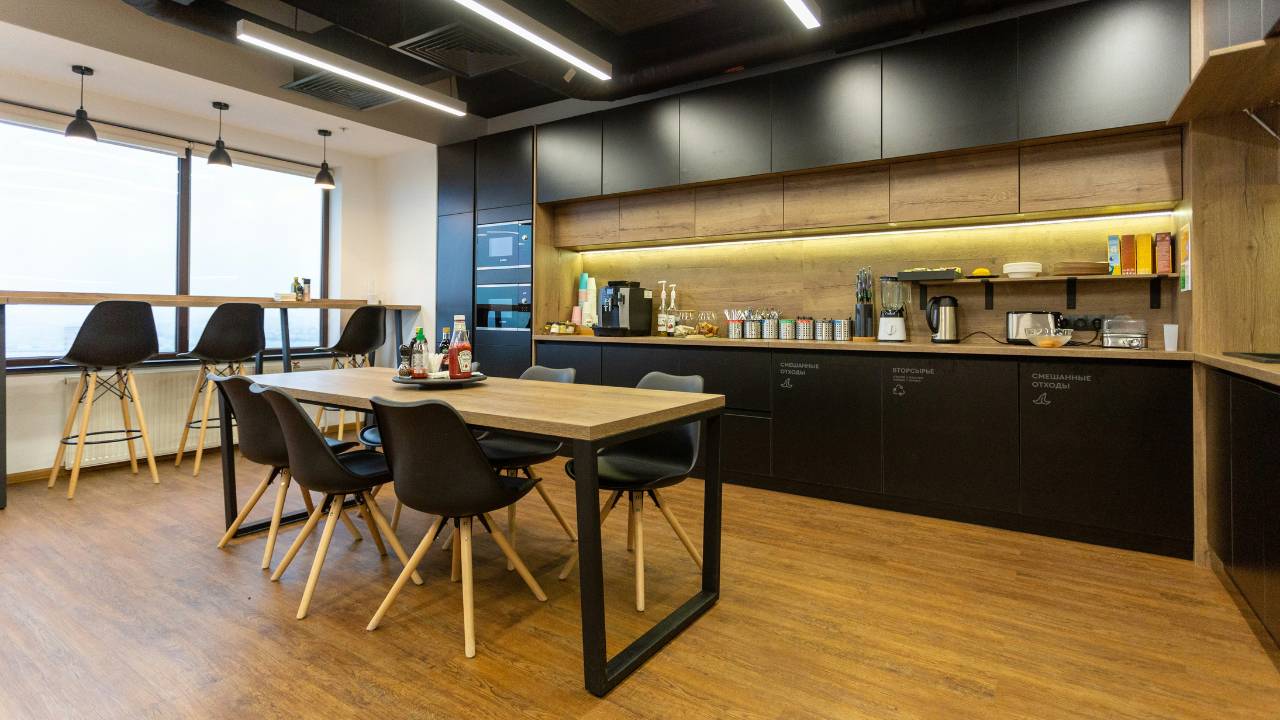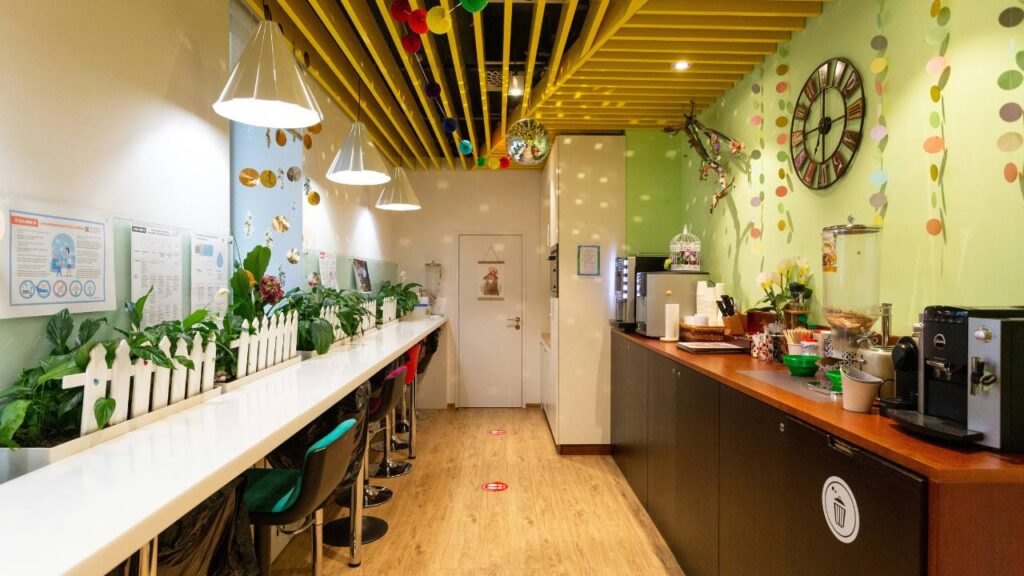
Every office needs a kitchen because it transforms the workplace into a more pleasant and productive environment. A kitchen is a central hub for employees to relax, recharge, and build camaraderie during breaks. When your team has a space to prepare meals and enjoy snacks, it boosts morale and fosters a sense of community.
Having a convenient place to prepare and store food encourages healthier eating habits among employees. Instead of relying on takeaway meals or vending machine snacks, staff have the option to bring their own nutritious food from home. This can lead to better overall health and increased energy levels throughout the workday.
An office kitchen also provides practical benefits, reducing the time employees spend going off-site to purchase meals. This can lead to shorter lunch breaks, ensuring more efficient use of time. It’s a small investment that pays off in increased productivity and employee satisfaction.
The Significance of Office Kitchens
Providing a kitchen in your office can significantly enhance both productivity and employee morale, creating a more efficient and satisfying work environment.
Boosting Productivity and Efficiency
An office kitchen is more than a convenience; it’s a productivity booster. When employees have easy access to a kitchen, they save time that would otherwise be spent going out for meals or snacks.
This increased convenience means fewer distractions and more focused work time. Having a kitchen allows for quick and healthy meal options, helping staff maintain their energy throughout the day.
By reducing the time spent away from their desks, employees can manage their work tasks more effectively. This efficiency translates into better performance and a smoother workflow, benefiting the entire organisation.
Enhancing Employee Satisfaction and Morale
An office kitchen serves as a communal space where employees can unwind and socialise, fostering a sense of community. This social interaction is crucial for building strong team relationships and improving overall morale.
When staff feel cared for through amenities like a kitchen, their satisfaction with their workplace increases. Having a space where staff can prepare their meals also promotes healthier eating habits, contributing to their overall well-being.
The presence of an office kitchen demonstrates that the organisation values its employees’ comfort and needs, leading to higher job satisfaction and, consequently, better retention rates.
Designing an Effective Kitchen Layout
Creating an office kitchen that is both functional and inviting involves careful consideration of space utilisation and the choice of appropriate furniture and appliances.
Optimising Space for Comfort and Use
Maximising space is crucial for the comfort of everyone using the kitchen. Start by analysing the available area and planning an efficient layout. Ensure there is ample room for movement, preventing congestion around high-traffic zones like the sink and refrigerator.
Consider the placement of key elements such as the fridge, microwave, and coffee machine. These should be easily accessible yet strategically positioned to maintain order. Incorporating multifunctional furniture like foldable tables or wall-mounted shelves can help save space.
JD Kitchens Dublin can help you with bespoke designs tailored to your office needs, offering innovative solutions that optimise every inch of your kitchen space.
Choosing the Right Furniture and Appliances
Selecting the right furniture and appliances is essential to a well-designed kitchen. Choose ergonomic seating options such as bar stools with proper back support or cushioned chairs for added comfort.
Quality appliances are vital for efficiency and usability. Opt for energy-efficient models to save on costs and support sustainability. Look for appliances with smart features that suit your office environment, such as a programmable coffee maker or a fridge with ample storage.
Health and Well-Being in the Workplace

A well-equipped office kitchen can significantly impact your health and well-being at work, specifically through promoting healthy eating habits and ensuring ergonomic kitchen furniture is available for your comfort and safety.
Promoting Healthy Eating Habits
Access to a kitchen at work encourages you to opt for healthier food choices.
You can prepare nutritious meals and avoid the temptation of unhealthy fast food. By stocking the kitchen with healthy snacks such as fruit, nuts, and yoghurt, you have easy access to good nutrition throughout the day.
Eating well at work improves your energy levels, concentration, and overall mood. The availability of a kitchen allows for better portion control and helps you avoid excessive consumption of processed foods that are high in sugars and unhealthy fats. Encouraging these habits in an office setting can lead to better health outcomes for everyone.
The Role of Ergonomics in Kitchen Furniture
Ergonomic design in kitchen furniture helps prevent physical strain and injuries.
Having ergonomic seating ensures that your spine is supported while you take breaks or eat meals, reducing the risk of discomfort and long-term back issues. Adjustable chairs and tables cater to different heights and preferences, promoting better posture and reducing muscle fatigue.
The layout of the kitchen should also prioritise safety, with surfaces and storage designed to minimise awkward reaching or bending. Non-slip floors and appropriate lighting contribute to a safer environment. By integrating ergonomic principles into the kitchen space, your workplace can support your physical well-being effectively.
The Heart of Office Interaction and Collaboration
An office kitchen plays a crucial role in fostering a communal atmosphere and serves as a hub for informal meetings. It significantly enhances team bonding and promotes a sense of community among employees.
Fostering a Communal Atmosphere
The office kitchen is a space where employees take breaks, prepare meals, and engage in casual conversation. This helps to create a sense of community and belonging. When you gather in the kitchen, you naturally form connections with your colleagues that might not occur in a more formal setting.
Sharing meals and snacks contributes to team bonding, as it provides an opportunity for staff to relax and have informal chats. These interactions can improve morale and camaraderie, leading to a more inclusive work environment. By facilitating these moments, the kitchen acts as the heart of social interaction within the office.
Kitchen as a Hub for Informal Meetings
The kitchen often doubles as a meeting area where spontaneous discussions can take place. These informal meetings are beneficial for brainstorming sessions, quick check-ins, or even collaborating on small projects without the need for booking a formal meeting room.
This informal setting encourages a more relaxed and open exchange of ideas, which is sometimes stifled in a traditional conference room. The power of open workspaces in business cannot be understated, as they foster a culture of transparency and accessibility. In these moments, innovation can thrive, and team members can build stronger working relationships.
By using the kitchen as a collaborative space, you can break down hierarchical barriers, making everyone feel more included and valued within the organisation.
Office Kitchens Reflecting Company Values

Your office kitchen can serve as a powerful representation of your company’s commitment to sustainability and its unique corporate culture.
Material Choices and Sustainability
Choosing the right materials for your office kitchen is crucial. Sustainable materials such as recycled wood, bamboo, and energy-efficient appliances not only support eco-friendly practices but also communicate your priorities. Implementing a robust recycling programme, with clearly marked bins, encourages employees to participate in sustainability initiatives.
Incorporating low-VOC paints and finishes reduces indoor air pollution and demonstrates your company’s dedication to a healthy workplace. These choices highlight your values and reflect a forward-thinking attitude toward environmental responsibility.
Design that Embodies Corporate Culture
The design of your office kitchen can mirror your company’s ethos and brand identity. An open-plan kitchen fosters a sense of community and collaboration among employees, reflecting an inclusive and communicative workplace culture. Bright, cheerful colours can enhance brand awareness and instil a positive atmosphere.
Introducing ergonomic furniture ensures comfort and well-being, aligning with values of employee care. Personalising the space with company memorabilia, artwork, or slogans can remind everyone of the shared vision and goals. In designing this space thoughtfully, you strengthen the bond among your team members and reinforce the corporate culture you take pride in.
Practical Tips for Kitchen Management
Managing an office kitchen effectively involves maintaining cleanliness and organisation while being mindful of the budget. Focusing on these aspects helps create a beneficial space for everyone.
Organisation and Cleanliness
Keeping the kitchen tidy requires consistent effort. Assign specific storage locations for different items, such as designated shelves for snacks, beverages, and utensils. Make sure items are labelled clearly to avoid any confusion.
It’s crucial to schedule regular cleaning tasks. You might opt for daily wipe-downs of surfaces and weekly deep cleans of appliances like fridges and microwaves. Encourage everyone to clean up after themselves. Place notices around the kitchen to remind staff of their responsibilities.
Using eco-friendly cleaning products can also help maintain a healthier environment. Ensure there is always a fresh supply of sponges, dish soap, and paper towels. Keeping trash bins emptied regularly and recycling appropriately will help keep the space hygienic and pleasant.
Maintaining a Budget Through Kitchen Operations
Managing the kitchen budget involves careful planning. Consider bulk buying non-perishable items such as tea, coffee, and sugar. This approach reduces costs and ensures supplies last longer. Develop a budget plan that accounts for regular restocking and unforeseen expenses.
Monitoring usage patterns can help you predict when to reorder supplies. Implement a system for tracking inventory so you can avoid overstocking or running out of essentials. This also helps to minimise waste.
Encouraging energy-saving practices, like turning off appliances when not in use, can lower utility costs. Providing reusable dishware instead of disposable options can reduce long-term expenses and is more environmentally friendly. By maintaining a balance between quality and cost-efficiency, you can manage the office kitchen budget effectively.
Keeping Up with Trends in Kitchen Design

To create an office kitchen that feels modern and functional, you must focus on integrating innovative features and offering customisation options that reflect personal tastes.
Innovative Features and Smart Kitchens
Smart kitchens are becoming popular, integrating technology to improve convenience and functionality. You might consider smart appliances like refrigerators with touchscreens, app-controlled coffee machines, or voice-activated assistants to streamline daily tasks.
Energy-efficient appliances are also a priority. Look for models with high energy ratings to save on utility costs. Consider incorporating induction cooktops or LED lighting, which offer both efficiency and style.
Integrated storage solutions are valuable to maximise the limited space in an office kitchen. Pull-out shelves, hidden compartments, and multifunctional furniture can make the kitchen area more organised and accessible.
Personal Touches and Customisation Options
Personal touches can transform a sterile kitchen space into a welcoming area. You can choose colour schemes and materials that reflect your office’s brand identity or cultural values. Custom cabinetry, countertops, and splashbacks allow you to personalise the space according to your preferences.
Consider adding elements like a chalkboard wall or custom artwork to make the kitchen unique. These features can also promote team engagement and creativity.
Offering different seating arrangements, such as bar stools, lounge chairs, or communal tables, lets employees choose how they want to use the space. Customisable layouts ensure that the kitchen serves various purposes, from casual meetings to relaxed breaks.
By focusing on these trends, you can ensure that your office kitchen remains a vibrant and essential part of your workplace.
Maximising the Impact of Your Office Kitchen
A well-designed office kitchen can significantly boost employee engagement and help retain talent. By focusing on improving kitchen facilities and acknowledging employee preferences, you can create a more productive and happy workplace.
Employee Engagement Through Kitchen Use
Office kitchens can become a central hub where employees connect and collaborate. Providing a comfortable space with amenities like quality coffee machines, microwaves, and well-stocked fridges encourages employees to take breaks together. These interactions can lead to stronger team bonds and improved communication.
Employee engagement often ties closely with how valued employees feel at work. Offering a range of healthy snacks and meal options accommodates diverse dietary preferences and shows that you care about their well-being. Comfortable seating areas and clean, inviting environments can also make a big difference.
Encouraging the use of the kitchen for informal meetings or brainstorming sessions can foster creativity. When employees feel they have a place to relax and gather, their overall happiness and productivity can see a significant boost.
Retaining Talent with Kitchen Facilities
Employees are more likely to stay with a company that anticipates and meets their needs. Kitchen facilities play a pivotal role in this. By offering conveniences such as free snacks, coffee, and even subsidised lunches, you make the workplace more attractive.
Retention rates improve when employees feel considered and catered for. High-quality kitchen facilities can demonstrate a company’s commitment to supporting work-life balance. When employees don’t have to worry about meal preparation, they can focus better on their tasks.
Moreover, a thoughtful kitchen space can reduce stress by providing a place for employees to unwind. This attention to detail can make employees feel appreciated, ultimately boosting job satisfaction and loyalty.
Conclusion
Having a kitchen in your office transforms the workplace atmosphere. It fosters community by providing a communal space where colleagues can gather, share meals, and have informal chats.
A kitchen also supports healthier eating habits. Rather than relying on fast food or vending machines, you’re able to prepare fresh, nutritious meals. This can boost your energy and productivity throughout the day.
Moreover, a well-equipped kitchen can save you time and money. By bringing your own meals, you avoid the cost and time associated with eating out.
Finally, the convenience of an office kitchen makes the workplace more enjoyable. It provides a comfortable place to relax and recharge during breaks.
An office kitchen isn’t just a functional addition; it’s a worthy investment in your team’s well-being and productivity.

